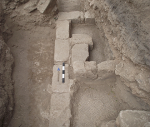You are here
Into the unknown
Apr 29,2014 - Last updated at Apr 29,2014
Palestinian President Mahmoud Abbas knew that he could never fill the shoes of his predecessor, Yasser Arafat, the avuncular leader of the Palestinian people.
Arafat’s charisma and intuitive style of leadership were in contrast to Abbas’ reserved demeanour and bureaucrat-like appearance.
For decades, Abbas was overshadowed by historical Palestinian figures such as Khalil Al Wazir, who engineered the first Palestinian Intifada and was killed by Israel as a result, and Salah Khalaf, who was also assassinated. It was the absence of these leaders that paved the way for Abbas to take over from Arafat upon his death in 2004.
Abbas, 75, is a scholar of history and a believer in the two-state solution in historical Palestine.
He was the architect of direct negotiations with Israel, which delivered the Oslo agreements and the Washington Accords in 1993.
Despite many setbacks in peace talks, following the assassination of prime minister Yitzhak Rabin in 1995, Abbas prodded Arafat to soldier on with negotiations under US auspices.
Even after the mysterious death of Arafat, Abbas, now the new chairman of the PLO, leader of Fateh and president of the Palestinian Authority (PA), continued to believe that negotiations, and not armed resistance, offered the only viable path for the Palestinians to achieve their long-cherished independent state.
Confrontations with Hamas, which resulted in the eviction of the PA and Fateh from Gaza in 2007, did not steer Abbas away from pursuing a peaceful settlement with an increasingly radicalised Israel. But he was unable to accept Israeli deals that contravened the most basic Palestinian demands: the right of return, full Israeli withdrawal from the West Bank, East Jerusalem as Palestine’s state and the dismantling of settlements.
Negotiations staggered and then they were suspended.
The election of Barack Obama in 2008 brought new hopes. The US president tried to bring the two parties back to the negotiation table. But he was rebuffed by an intransigent Benjamin Netanyahu who paid lip service to the two-state solution but pursued aggressive settlement expansions in the West Bank and East Jerusalem.
Abbas came under US pressure to join the talk anyway — and he did when US Secretary of State John Kerry asked for a nine-month window to reach a final settlement.
The deadline for this round ended on April 29. But even before that Abbas knew that Israel was offering nothing and that all it wanted was negotiations for negotiation’s sake; an endless game giving Israel the opportunity to change the facts on the ground on permanent basis.
With his popularity sagging among his followers and after 20 years of fruitless talks with the Israelis, Abbas is finally making groundbreaking change in his approach and convictions.
Frustrated, in the past he threatened to walk away or disband the PA. But he was never taken seriously.
But a slow transformation began to take place last year when he applied for the non-member status for the state of Palestinian at the UN General Assembly. He won an historic victory even though he angered Washington and Israel.
Two weeks ago, when Israel reneged on an agreement to release a fourth batch of Palestinian prisoners, Abbas took a leap of faith into the unknown.
He quickly signed 15 agreements to join international treaties and organisations.
The US and Israel were taken aback. Then he got in touch with Hamas and asked that a long-delayed national reconciliation agreement be signed in Gaza as soon as possible.
Last week, the PLO and Hamas signed that agreement, ending eight years of rift and paving the way to hold legislative and presidential elections across the West Bank and Gaza.
Israel was incensed and the US said the agreement was “unhelpful”. Netanyahu threatened retaliation. He suspended contacts with the PA and ordered a series of punitive economic measures. Still Abbas held his position.
Few days ago, Abbas addressed the central council of the PLO in Ramallah. It was an historic speech that revealed a new version of the Palestinian leader.
Defiantly, Abbas told Israel that he was ready to resume negotiations but under new conditions: Israel must freeze all settlements and release Palestinian prisoners; reconciliation will survive and a technocrat government, headed by him, will oversee elections and will recognise Israel but not as a Jewish state. But more importantly, Abbas said that if Israel refuses these conditions, it must be ready to come and take over as an occupying power and face the consequences.
This time Abbas took the initiative. It is a risk that he now seems ready to undertake as he seeks to build his own legacy.
His frustration with Israel, having been the one who believed firmly in peaceful negotiations, underlines the hard facts that the Palestinians face today.
His speech was received positively in Washington, infuriating Israel even further. The Israeli reaction was typical: it launched a media campaign to demonise the only man with whom they could have reached a fair deal.
But that could backfire. Israel’s options are limited, especially if Abbas goes ahead and joins more world organisations, thus fortifying the fact that the state of Palestine is under occupation, and if he removes the two-state solution from the table.
It took more than 20 years for Abbas to reinvent himself as a Palestinian leader.
As he faces Israel’s wrath, he now needs all the Arab help he can get. This is probably the most dangerous phase in the evolution of the Palestine cause, but it also puts Israel before unprecedented challenges.
The writer is a journalist and political commentator based in Amman.













